For more than five years, citizen scientists in dozens of countries combed beaches, waterways, parks, busy city streets and other public areas in an ambitious bid to quantify the amount of plastic waste in the environment and track its source.
They carefully recorded the brand or trademark on each plastic item and the number of items with those brands wherever possible, also noting the location, date, type of plastic, type of item, number of plastic layers and time of each audit event, which ran from 2018 to 2022.
Now, researchers have synthesized those results in a new paper that found a clear link between plastic production and plastic pollution, such that a one-per-cent increase in plastic production was associated with a one-per-cent increase in plastic pollution in the environment.
The team, including co-author Dr. Tony Walker of Dal's School for Resource and Environmental Studies, also determined that companies producing single-use consumer goods disproportionately contributed to the problem more than household and retail companies, and that most collected items had no discernible brand.
"We were surprised to find that the direct relationship between plastic production and plastic pollution was consistent around the world, irrespective of whether the litter audits were conducted in the global north or global south," says Dr. Walker, noting that plastic production doubled to about 400 metric tons from 2000 to 2019.
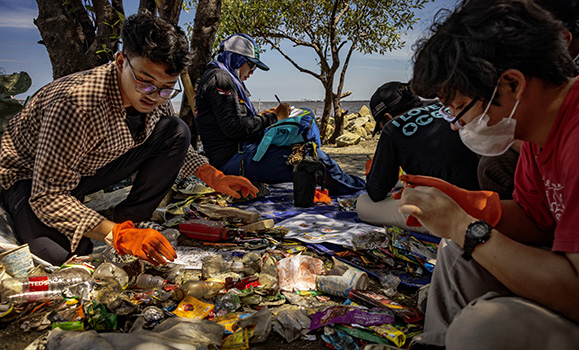
Volunteers for Greenpeace Indonesia take part in a brand audit on January 20, 2024 in Jakarta, Indonesia. (Ezra Acayan photo)
"This confirms that companies responsible for omnipresent plastic pollution is consistent no matter where you live."
Data 'speaks for itself'
The study, published Wednesday (April 24) in Science Advances, marks the first robust quantification of the global relationship between production and pollution, and comes at a time when world leaders are meeting in Ottawa to hammer out a Global Plastics Treaty at the fourth annual International Negotiating Committee, or INC-4.
They also discovered that about 52 per cent of the more than two million inventoried plastic items had no identifiable brand, highlighting the need for better transparency about production and labeling of plastic products to enhance traceability and accountability. The researchers suggest creating an international, open-access database into which companies are obliged to quantitatively track and report their products, packaging and brands.
"When I first saw the relationship between production and pollution, I was shocked," says co-author Win Cowger of the Moore Institute for Plastic Pollution Research. "Despite all the things big brands say they are doing, we see no positive impact from their efforts. But on the other hand, it gives me hope that reducing plastic production by fast-moving consumer goods companies will have a strong positive impact on the environment.”
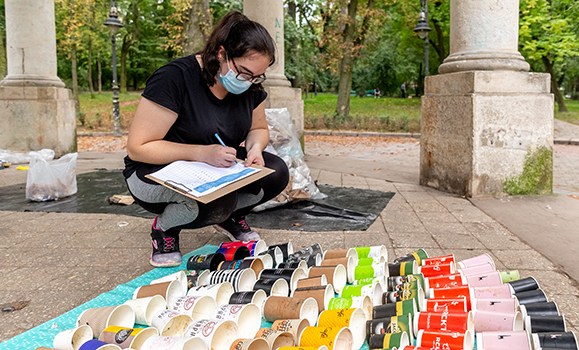
A volunteer in Lviv, Ukraine, recording data on single-use cups. (Andriana Syvanych photo)
The research, led by scientists at Dalhousie and a dozen different universities in the United States, Australia, the Philippines, New Zealand, Estonia, Chile, Sweden and the U.K., found that 56 global companies are responsible for more than half of all branded plastic pollution. The paper states that the top five producers of branded plastic pollution were Coca-Cola Company, which was responsible for 11 per cent of roughly 910,000 branded items, followed by PepsiCo (5%), Nestlé (3%), Danone (3%), and Altria/Philip Morris International (2%). The top companies produce food, beverage or tobacco products.
"This global branded plastic pollution data speaks for itself and demonstrates unequivocally that the world's top global producers are the biggest plastics polluters,” says Dr. Walker.
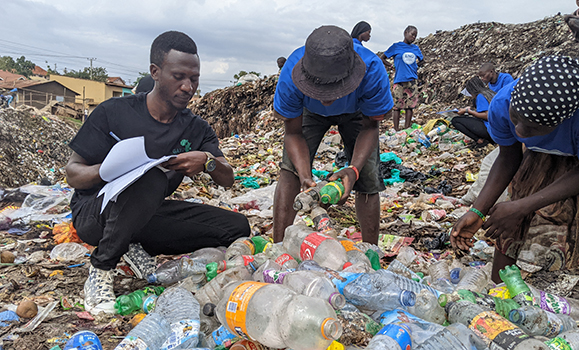
Volunteers from Green Africa Youth Organization and End Plastic Pollution Uganda examine branded plastic waste and record brand audit data in Kampala, Uganda. (Nirere Sadrach photo)
Paradigm shift needed
The five-year analysis used data from 1,576 audit events in 84 countries. Brand audits are citizen science initiatives in which volunteers conduct waste cleanups and document the brands collected. More than 100,000 volunteers submitted data through Break Free from Plastic or the 5 Gyres’ TrashBlitz app.
The authors state that the strong relationship between plastic production and pollution, across geographies and different waste management systems, suggests that reducing the production of single-use plastic consumer goods could curb global plastic pollution.
"Findings from this study suggest we need a paradigm shift in how we regulate plastic producers, especially the top branded producers that are responsible for half of branded plastic pollution," says Dr. Walker.
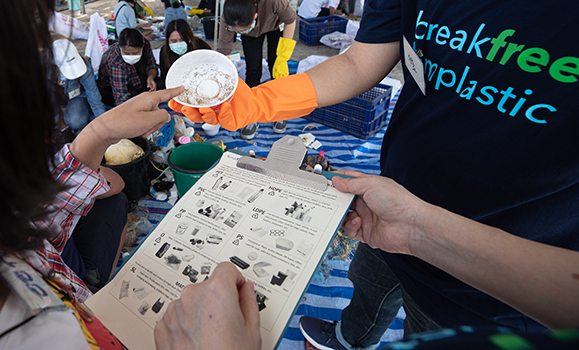
A visual guide helps volunteers categorize different types of plastic waste during a brand audit in Thailand in 2020. (Wason Wanichakorn photo)
For world leaders, this research serves as a tool to support a legally binding treaty that includes provisions on corporate accountability, prioritizing plastic production reduction measures, and promoting reuse and refill systems.
"Our study underscores the critical role of corporate accountability in tackling plastic pollution," says Dr. Lisa Erdle, director of Science and Innovation at the 5 Gyres Institute. "I urge world leaders at INC-4 to listen to the science, and to consider the clear link between plastic production and pollution during negotiations for a Global Plastics Treaty."
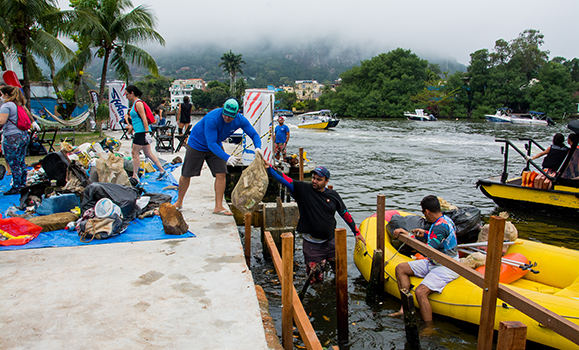
A team of volunteers transfers bags of plastic waste from their boat onto shore in order to begin auditing the sample as part of a brand audit in Brazil in 2021. (Renato Errejota photo)

